Interview
with Arnold Roth
President
Joe Biden met with King Abdullah of Jordan last week. We know what they
talked about and what they didn’t talk about because the White House issued a statement
outlining the points of discussion. Omitted from that statement is any mention
of the failure of Jordan to honor its extradition treaty with the United States.
Also missing from the White House statement is any mention of Ahlam
al Tamimi, a terrorist, or of the American citizens in whose murder she
played an instrumental role. Tamimi chose the venue for the massacre, a central
Jerusalem pizzeria; the time the massacre would take place, lunch hour, when
the restaurant was sure to be at peak capacity; and she drove the bomber to the
location she had chosen, ensuring that all would go as planned.
Among the 15 civilians murdered that day in 2001 were Shoshana
Greenbaum, a pregnant woman, and Malki Roth, a 15-year-old girl. Joe Biden would
have been careful to refrain from mentioning their names to Abdullah, because the
subject of extraditing Tamimi is a touchy one. Tamimi is popular in Jordan,
famous for murdering Jewish children.
 |
| Tamimi enjoys celebrity status in Jordan. Here she brags on Jordanian television about the Sbarro terror attack in which she played an instrumental role |
Tamimi was nonetheless the mastermind of a massacre of
United States citizens, and it is clear that this should be the sitting US
president’s first, and ultimate concern. That it is not Joe Biden’s first or
ultimate concern, is a grave thing to contemplate. It is wrong. But not the
only wrong.
Far worse, perhaps, is the fact that Tamimi is only living
free in Jordan as a celebrity, because a prime minister of Israel arranged for
her release to that country, directly from an Israeli prison. That prime
minister was Benjamin Netanyahu.
In his 1995 book, “Fighting Terrorism,” Netanyahu wrote that
prisoner exchanges were "a mistake that Israel made over and over
again." and that refusing to release jailed terrorists was "among the
most important policies that must be adopted in the face of terrorism."
The release of convicted terrorists before they have
served their full sentences seems like an easy and tempting way of defusing
blackmailed situations in which innocent people may lose their lives, but its
utility is momentary at best," said Netanyahu. "Prisoner releases
only embolden terrorists by giving them the feeling that even if they are
caught, their punishment will be brief. Worse, by leading terrorists to think
such demands are likely to be met, they encourage precisely the terrorist
blackmail they are supposed to defuse.
 |
| Rep. Greg Steube (R-FL 17th District) |
The former Israeli prime minister broke with his own
philosophy to release 1,027 Arab terrorists for a
single Israeli captive, Gilad
Shalit, in 2011. Ahlam Tamimi was one of the terrorists released on that black,
black day, 11 years ago. Until now, the parents of Malki Roth, Arnold and
Frimet Roth, have fought to get American officials and the mainstream media to
take note of this travesty, and to act. Someone finally did, Rep.
Greg Steube (R-FL 17th District), who has introduced a bill to
limit US assistance to Jordan until the validity of 1995 extradition treaty
between the two countries, is recognized.
Arnold Roth took the time to update us on efforts to
extradite Tamimi from Jordan, and the much-appreciated active role Congressman
Steube has taken in seeking #justiceforMalki:
Varda
Epstein: Netanyahu broke with his own philosophy as outlined in his 1995 book, “Fighting
Terrorism,” to release 1,027 Arab terrorists for a single Israeli captive in
2011. What do you know about what went into that decision? Is it possible that
pressure was brought to bear on Netanyahu by the Obama Administration?
Arnold Roth: Netanyahu happens to have been in Melbourne, where
both Malki and I were born, on that awful August day in 2001 when the Sbarro massacre
happened and we lost a child. Friends who saw this happen say he was asked by
Australian journalists to comment on a terror outrage since one of the victims,
according to the reports just then coming in, was a Melbourne girl, a lovely,
smiley teenager of 15 – my daughter.
I was told that when he responded, the former prime minister of
Israel (who became prime minister once again eight years later) used the
expression “my heart goes out to them”. He followed that with some reference to
visiting us when he was back in Jerusalem. He of course didn’t visit us but the
expression “my heart goes out to them” is etched into my memory because it
happens to be one of the things he said when he addressed the nation in October
2011. The occasion was his announcing that he had a done a deal with Hamas to
free an Israeli soldier held hostage by them for five years, Gilad Shalit.
It's worth dwelling for a moment on the key paragraph of a
best-selling book from the 1990s entitled “Fighting Terrorism: How Democracies
Can Defeat Domestic and International Terrorists”. In the edition I am looking
at as I answer you, Varda, the one published by Farrar Straus Giroux* in 1995
at page 144, the acclaimed author writes:
“A government that seeks the defeat of
the terrorists must refuse to release convicted terrorists from prisons…
Releasing imprisoned terrorists emboldens them and their colleagues… By
nurturing the belief that their demands are likely to be met in the future, you
encourage terrorist blackmail of the very kind that you want to stop. Only the
most unrelenting refusal to ever give in to such blackmail can prevent this.”
The words of that last sentence ring powerfully for me. But
actually the whole quote makes solid sense. The person who wrote them is of
course the Israeli leader did the deal with Hamas that served as my daughter’s
murderer’s incomprehensible ticket to freedom.
“I keep wondering if he ever read it"
His name is Benjamin Netanyahu and I keep wondering if he ever
read it. It’s disappeared of course, from bookstores everywhere now, and for
good reason.
I don’t know what motivated him to transact a massive swap of
1,027 terrorists for a captive Israeli soldier, and to market it so heavily to
the Israeli public that freeing Shalit at any price (“any price” is the term I
remember being used freely when this was happening) had enormous support for a
while.
It was of course, like so many things in political life, bogus, a
lie wrapped around a tiny grain of truth. There are many, many things Israel
would never have done to free Shalit. This one just seemed affordable to the
shameless insiders who cooked it up.
Terrible acts of terror against Israelis were executed in the
years after the deal was done, executed by people who were in prison right up until
the day Shalit walked free, with many of them sentenced to stay there for the
rest of their lives, like Ahlam Tamimi.
“His wife pressed him to do it”
But they were freed by Israel and have gone on to lead
high-profile lives as terrorists. Yahya Sinwar, for instance, who took over the
leadership of Hamas in the Gaza Strip in 2017 and has much blood on his hands.
Netanyahu once said publicly that he did the Shalit deal because
his wife pressed him to do it. For some people, let’s say politicians for
example, that’s as good a reason as any. I would feel a little less hostile to
the man if he had ever taken the trouble to speak with us in the years he was
prime minister, a job he lost in 2021. But he never did. And in fact his office
remained locked and impervious for years to our efforts to appeal for Israeli
help in the Tamimi extradition. Or more accurately, to stop interfering with it. [Emphasis added, V.E.]
Netanyahu won’t get invited to any of my family’s future
celebrations. My heart doesn’t go out to him.
 |
| The Roth family at Malki's Bat Mitzvah |
Varda
Epstein: Considering the lack of any meaningful effort by successive US
administrations to extradite Ahlam Tamimi from Jordan for the murder of two US
citizens, is it possible that the US is bowing to pressure from Israel? What
rationale would there be for Israel to quash these efforts?
Arnold Roth: I assume there are multiple factors at work but, yes,
I have heard from sources in Washington that there is a view among government
insiders that Israel is fine with Tamimi being left alone in Jordan. Whether or
not it’s true, the consecutive US administrations of Obama, Trump and Biden
have all praised good king Abdullah in ways that are hard for ordinary people
to understand. There are compelling reasons why the US ought to be very wary of
giving him the moral and political and – which may surprise some people – financial
backing that he gets.
Abdullah wields significant power as the owner and operator of the
family business – the Hashemite Kingdom. In the past two decades, this has been
a profitable undertaking for its shareholders, not so much for its subjects.
Jordan may be a basket-case economically, hugely dependent on handouts and with
a population suffering from a badly-run economy. But this hasn’t prevented its
free-cash flow from serving as the way its king has quietly (until this was
exposed in a series of major global news investigations) and surreptitiously
become a real estate tycoon in the United States.
“I know there are analysts and think-tank mavens far better informed than me who say it’s best not to endanger his or Jordan’s stability. But those are
sentiments of the kind that make sense when they come with no price.”
He owns a much real estate and multiple private aircraft. A
well-trained, lavishly equipped military force serves his needs. And since his
country is now officially designated (in Freedom House’s most recent global
survey) as unfree, it’s obvious he has little fear of his country’s media,
parliament or mobs. The evidence is he has excellent connections in the US with
powerful friends in Washington and a major US military presence based inside
his kingdom’s borders. Less well known is that he spends a fortune on US
lawyers and lobbyists.
I know there are analysts and think-tank mavens far better informed
than me who say it’s best not to endanger his or Jordan’s stability. But those are
sentiments of the kind that make sense when they come with no price.
But the reality is that the hypocrisy and double-talk comes at a
high price. Jordan flagrantly breaches its most important treaty with the US
and communicates to its people that it stands firmly with the fugitive bomber.
It has never paid a price for its embrace of terror. That’s no way for foreign
relations to be conducted. It gets noticed by others and in the end, especially
in bad neighborhoods like the one where Jordan operates, it comes back to bite
you. The way we think about Jordan is long overdue for a reality check.
Varda
Epstein: How did Congressman Greg Steube become aware of your situation and the
refusal of the US government to get tough with Jordan regarding the existing
extradition treaty? Can you outline for us the steps Rep. Steube has taken to
bring some justice to this situation? Why now?
Arnold Roth: To his credit, Congressman Steube, a Republican from
Florida, has stepped up to the plate several times to press Jordan on this important
matter of justice.
Two years ago, the excellent people of EMET Endowment for Middle
East Truth led by Sarah Stern suggested that he be the key signatory on a letter from
Congress about Tamimi directed at Jordan’s then and current ambassador to
Washington. You might be interested to know the ambassador never bothered to respond.
Then in March 2022, Rep. Steube led ten Congressional colleagues
in another letter, this one addressing Secretary
of State Blinken That too has so far gone unanswered.
As to why now, that would be a good question to ask Steube’s
staff. I could imagine him watching with rising fury as Jordan shows ever
greater signs of developing into a totalitarian society, having an unfree media
culture, providing a safe environment for hateful ideologies, educating its
children to think antisemitically and all the while pocketing more foreign aid
from US taxpayers than almost any other country – while trampling a strategic
treaty with its largest and most important ally.
When you view it that way, the real question might be this: where
does the over-the-top warm reception extended last week to King Abdullah by
Congressional lawmakers and the President of the United States come from?
 Varda
Epstein: There has to be a sense of betrayal that Israel released your
daughter’s murderer from prison, especially since you threw in your lot with
the Jewish State by making Aliyah. Your wife is American. Does she feel a sense
of betrayal as an American citizen at the lack of will to push for extradition?
How does it feel to be doubly betrayed, so to speak?
Varda
Epstein: There has to be a sense of betrayal that Israel released your
daughter’s murderer from prison, especially since you threw in your lot with
the Jewish State by making Aliyah. Your wife is American. Does she feel a sense
of betrayal as an American citizen at the lack of will to push for extradition?
How does it feel to be doubly betrayed, so to speak?
Arnold Roth: That’s a hard question to answer. Not because I don’t
feel those things but because complaining of being betrayed doesn’t go down
well or get you far in the court of public opinion. People have a hard enough
time with their own problems.
So first about Israel. Yes, we have certainly been betrayed.
That’s the right word: we had rights and they were and are being cruelly
trampled and with no regard to what this does to our values as a society. Or to
people like us.
“Watching as the convicts walked triumphantly free”
In this, we are not alone. The same thing can be said by all
the other families who experienced the murder or maiming of loved ones by
terrorists who were sentenced to long prison terms by judges applying very
respectable judicial criteria and then watching as the convicts walked
triumphantly free.
That should never have happened. Those who argue differently need
to review what they think they know about justice and Jewish values.
But it’s clear to us that Israel as a nation didn’t betray us. It
was politicians. There’s much more I would want to say about that aspect but
not now. We remain as Zionist as the day we arrived in Israel, passionate and
proud to be raising our children and grandchildren in the Jewish homeland.
“Did the US betray us? No, and this is a good moment to say that we get
gratifying support from wide parts of American society.”
I’m not an American. But Malki was and so are my wife and children.
Did the US betray us? No, and this is a good moment to say that we
get gratifying support from wide parts of American society. But as with Israel,
the politicians – except for those who have shown a distinct sense of morality
and honor – do what politicians do and hurt us in heartless ways.
From conversations with US government officials, we have the sense
– never said to us in this way – that there’s more interest in seeing Ahlam
Tamimi slip away and somehow disappear into the desert than in having her stand
trial in Washington.
This is not a partisan political thing; we are almost, though not
quite, as infuriated by how the GOP has pushed past the Jordan/Tamimi issue as
we are by the Democrats. Again, this isn’t about which side of the US divide you
stand on.
Much of America’s Jewish community leadership has been unhelpful
and cold. Having said that, it’s an exceptionally painful subject that I don’t
want to address here. At some point we will because there’s much we have
learned on this that we would have preferred never to know. And people ought to
know.
Here’s what I want to say about the US government. Other than at
the political leadership level, the Justice Department and the FBI have always
given us the sense of being with us and wanting the same result we want –
Tamimi in a federal court on trial for her terrorism and the deaths she caused.
We sincerely appreciate the hard work that has kept the pursuit of the Sbarro
bomber going all these years.
“He/she skipped the briefing.”
This is relevant to something that happened some weeks ago when
Frimet and I met with a significant US government figure (hereafter SUSGF). And
here’s the only part of it worth raising in today’s interview. We were told
ahead of time by our own sources that SUSGF was going to receive a briefing
before our sit-down from well-connected officials in Washington. But in
speaking with us for an hour or so, SUSGF volunteered half-way through that
he/she skipped the briefing. Hence our mild hope of getting some insight into
why we have been treated as pariahs for so long by the government of which our
murdered child was a national was misplaced. We learned nothing. The experience
was a waste of everyone’s time.
There’s no point in sharing my feelings about the governments of
the past. But here’s a thought about the current administration.
Speaking in July 2021 during the first of the three official
visits to the US made by King Abdullah in the past ten months, President Biden
called Jordan “loyal and decent friend… We’ve been hanging out together for a
long time. It’s good to have him back in the White House.”
“What’s decent about an ally shirking a treaty to appease popular bigotry?”
The same day those comments were reported in the New York Times, Frimet
and I wrote an open letter to President Biden. It was published prominently in
the Wall Street Journal:
The president, a grieving parent
himself, pledged during his inauguration speech to write “an American story of
decency and dignity.” Is anything more dignified than doing justice? What’s
decent about an ally shirking a treaty to appease popular bigotry?
That question is still on my mind. And again, no response has ever
come from the White House.
We also wrote a private letter to Secretary of State Blinken six
weeks earlier, in July 2021. He has never answered.
Varda
Epstein: On March 20, 2017, the Jordanian Court of Cassation ruled the
extradition treaty invalid. Yet we know the US has requested extradition and
received fugitive terrorists from Jordan on multiple occasions. Why does Jordan
not honor the treaty in practice, if not by law, in the case of Tamimi?
Arnold Roth: Though Abdullah has given various explanations
for why Jordan cannot extradite Tamimi, these have all been behind closed
doors. He has never publicly addressed the issue. But we do know that Tamimi is
a popular Jordanian folk hero.
Varda Epstein: Why do you think that your family was not forewarned before Tamimi was released in the Shalit Deal? Was it an oversight? Arnold Roth: Not an oversight in any sense. In the eyes of the Israeli government, the need was urgent and the relevant officials had no intention of letting messy citizen actions get in the way. I also think some of them, at least, were aware of how morally and strategically wrong the Shalit Deal was in every respect. So why take chances? Rush it through and let history work out who was right and who wrong.
Murdered Israelis did not get to vote.
Varda
Epstein: We know that President Biden met with King Abdullah on Friday. Have
you had any information regarding the contents of their conversation? Do you
know if the subject of Tamimi’s extradition was raised?
Arnold Roth: America gives tremendous influence to its appointed
spokespersons. We have fought to see US justice done since 2012 – a decade. We
have come up against spokespersons in the White House and the State Department
several times and been deeply embittered by how that process works. With a
handful of notable exceptions, there’s no one in the ranks of the media who
attend those briefings who has the interest or skill to go head-to-head with
them.
So the last time, a year ago, that King Abdullah paid official
calls in Washington, the spokespersons in both the White House and the State
Department were asked by, as it happens, Associated Press journalists in each
place whether the Tamimi issue had come up. The answers they got are a disgrace
to the White House and the State Department. They were evasive, unclear and
essentially meaningless. There is a serious game being played by these US
government employees and it doesn’t get exposed often enough.
An official
readout was issued by the White House after President Biden’s tête-à-tête
with Abdullah this past Friday. Here’s what it says about Tamimi:
[The two heads of state] reaffirmed
the close and enduring nature of the friendship between the United States and
Jordan. Jordan is a critical ally and
force for stability in the Middle East, and the President confirmed unwavering
U.S. support for Jordan and His Majesty’s leadership. The leaders consulted on recent events in the
region and discussed urgent mechanisms to stem violence, calm rhetoric and
reduce tensions in Israel and the West Bank. The President affirmed his strong
support for a two-state solution to the Israeli-Palestinian conflict and cited
the need to preserve the historic status quo at the Haram al-Sharif/Temple
Mount. The President also recognized the Hashemite Kingdom of Jordan’s crucial
role as the custodian of Muslim holy places in Jerusalem. The leaders discussed
the political and economic benefits of further regional integration in
infrastructure, energy, water, and climate projects, with Jordan a critical hub
for such cooperation and investment.
They agreed to remain in regular touch and further enhance the historic
ties between our countries.
In other words, zero. [Emphasis
added. V.E.]
Jordan’s trampling of the 1995 treaty continues and America’s
chief executive is fine with it. That’s a showstopper in my opinion. And
completely at odds with what he declared in his inauguration speech.
Varda
Epstein: Presumably Malki was also an Australian citizen? Australia appears to
have signed an extradition treaty with Jordan in 2017, but it is not yet enforced.
Can you tell us a bit about this? Why has the proposed extradition treaty not
yet been enforced? Are you in touch with authorities on this score? What
efforts are you making on the Australian front?
Arnold Roth: Not so. Yes, Malki was born in Australia. Australia
spent years negotiating an extradition treaty with Jordan but it pulled out of
the negotiations a year or two ago. Australia, for good historical reasons, has
warm relations with the Hashemite kingdom.
That's what brought me to write an op-ed in The Australian, five
years ago this week in fact. In it I called on then-prime minister Malcolm
Turnbull to in effect have a quiet word with his mate King Abdullah. Turnbull's
answer was a welcome one, but the follow up by others in his government was
not. The initiative ended up falling by the wayside.
For the past two years I made similar efforts with the current
Australian leadership via the prime minister's team and his foreign ministry -
with frustratingly disappointing outcomes. At this point, Frimet and I have
stopped knocking on their doors.
“Justice, Tamimi, Jordan cannot possibly be partisan issues. But there you
are. It’s galling.”
Varda
Epstein: Is there any US official other than Rep. Steube who has taken an
interest in your plight? Is there something American citizens can do to get
their own representatives to act? What makes this a propitious time to press
for extradition?
Arnold Roth: There is a small handful of lawmakers who have
consistently given us their support. But rather than dwell on their identities,
the larger point is that we get far less support – almost none -- from the
Democrat side. Justice, Tamimi, Jordan cannot possibly be partisan issues. But
there you are. It’s galling.
Varda
Epstein: Has what happened affected you at the polls, and if so, how? Would
you, could you ever support the man who released Tamimi from an Israeli prison?
Arnold Roth: Well phrased. The Shalit Deal cured me of any
lingering confusion about politicians capable of doing what Netanyahu and the
many who followed him into the catastrophe did. I’m no zealot and am perfectly
aware that Bibi has a large following. I don’t preach against him but I have no
hesitation in sharing my views of the man and what in my opinion he represents.
Varda
Epstein: Let’s say your efforts are rewarded, that Tamimi is extradited to the
US and tried in an American court of law. Let’s imagine that she is found
guilty and punished. What would that mean for the world, for Jordan, and for
your family?
Arnold Roth: It will be an essential affirmation that terrorism is
outside the boundaries of what society can tolerate. The failure to adhere to
this principle is a catastrophe wherever it happens. And leaders who bring
catastrophes on their people ought to suffer rejection and marginalization.
Until that happens, it’s clear to us that in fighting for the
principle, we are the ones rejected and marginalized.
*Slightly different than the passage cited in my introduction to
this interview, from Background:
In book, PM warned not to release terrorists. I chose to include both excerpts for
greater clarity of intent.
|
 Buy the EoZ book, PROTOCOLS: Exposing Modern Antisemitism today at Amazon! Buy the EoZ book, PROTOCOLS: Exposing Modern Antisemitism today at Amazon!
Or order from your favorite bookseller, using ISBN 9798985708424.
Read all about it here!
|

|











.jpg)





































